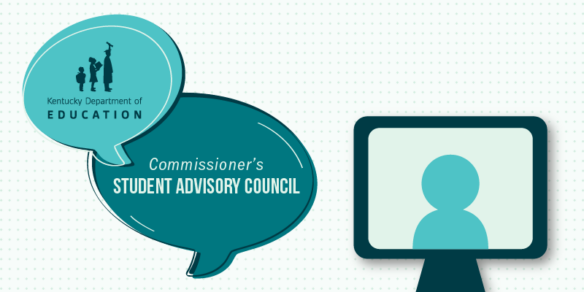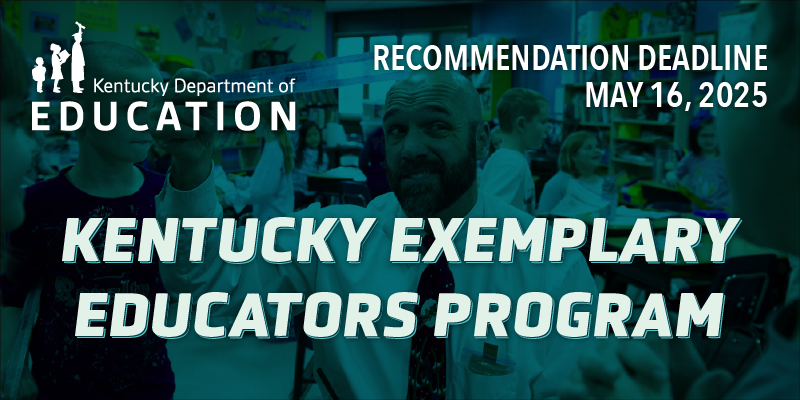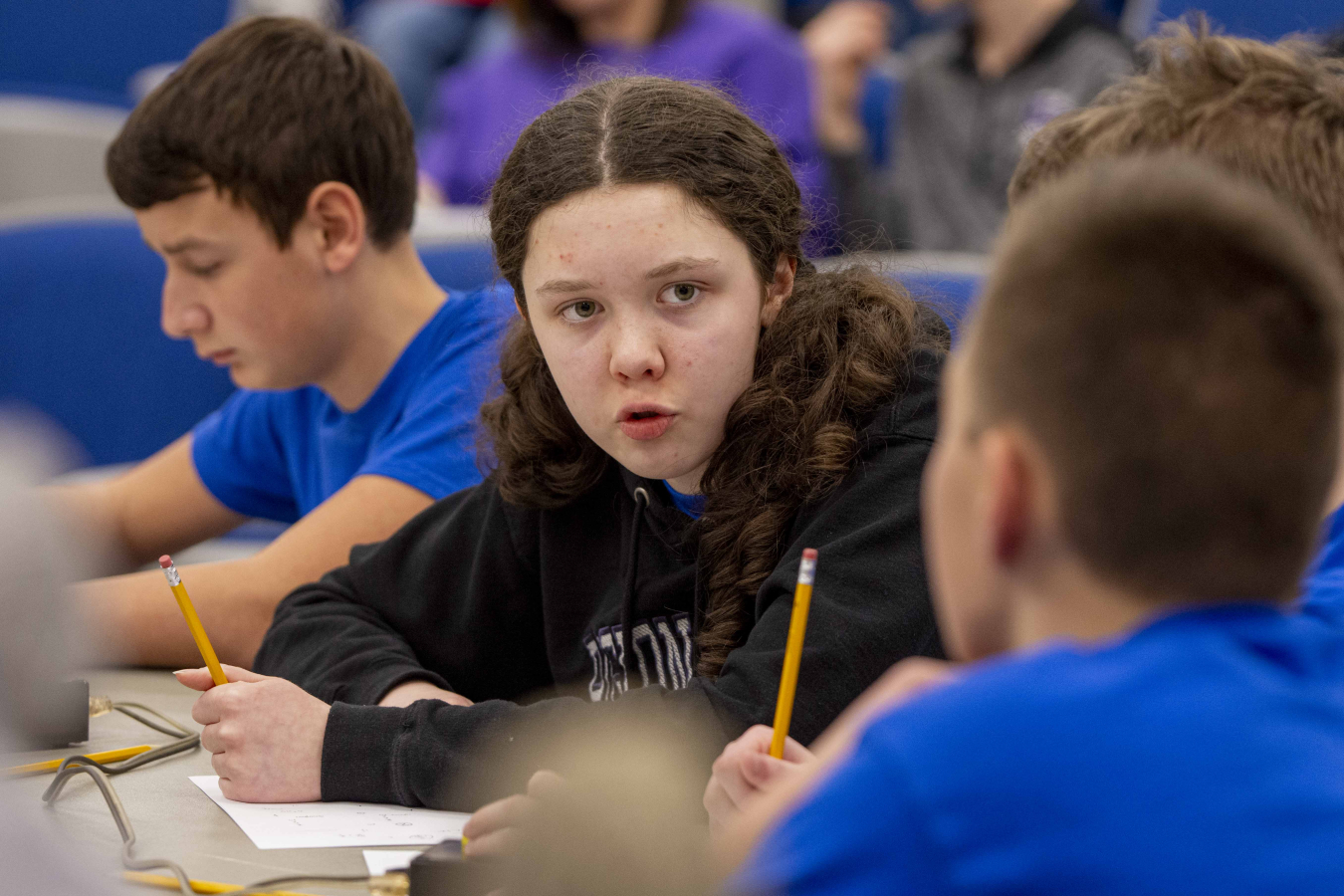
The Kentucky Department of Education’s (KDE’s) Commissioner’s Student Advisory Council met on Oct. 18, where members discussed the Kentucky Board of Education’s 2024 legislative priorities with Meredith Brewer, KDE’s executive director of education policy.
Along with a general operating budget that is submitted to the General Assembly, Brewer said there also is an opportunity to submit additional budget requests for areas that may need extra funding. Those additional requests include:
- Increase the Supporting Education Excellence in Kentucky (SEEK) base amount and the amount for SEEK transportation;
- Fund universal preschool;
- Provide supports for the education workforce;
- Provide school improvement services to more schools through the Kentucky Educational Recovery Fund;
- More funding for Kentucky Education Technology System (KETS); and
- Funding for Read to Succeed.
“We can submit these items that are identified as either important policy initiatives or projects that we feel are important to prioritize,” said Brewer. “Those additional budget requests are brought before the board and each department is asked to identify what those budget requests might entail.”
Brewer said in recent sessions the General Assembly has shown its support with the Kentucky Board of Education’s (KBEs) legislative priorities when it comes to career and technical education (CTE).
“Many of you are probably familiar with or participate in CTE programs in your schools and you know how amazing it is to have a chance to learn about a future career path,” said Brewer.
She said the Kentucky Board of Education is requesting the General Assembly revise the CTE funding formula to create equity for every CTE student and program in the Commonwealth. The board also would like the formula to incentivize indicators of high-quality CTE programs that are important for workforce development.
Brewer said the KBE also is looking for more support for the Kentucky School for the Blind (KSB) and Kentucky School for the Deaf (KSD) to ensure sustained services for students.
“It’s a unique experience where students live on campus. There are services provided for students that do not choose to live on campus, but for the most part, those are residential programs, so there are obviously additional costs associated with that,” she said.
Brewer said in the most recent budget, there was additional funding for Advanced Placement (AP) to provide opportunities for AP test fees to be covered using state funding.
“We are advocating for some flexibility for those dollars,” she said. “So, if those dollars are not expended as part of test reimbursement, those funds could be used for support services for students to prepare for the assessment, or for professional development for teachers that are teaching those courses.”
In addition to these priorities, Brewer said the KBE also will be looking at areas like statutory cleanup to remove outdated or unused reporting requirements that cost districts time and money, codifying HB 678 (2022RS) to make permanent district flexibilities and provide predictability for facility processes, and paid student teaching opportunities.
Student Feedback
Interim Commissioner of Education Robin Kinney met with the students for the first time since taking on the role Sept. 30. She posed the question, “What would you do to be successful if you were placed as an interim principal at your school?”
“If I was a principal for the whole school year, I would focus on what people felt about areas of excellence and where we could improve,” bettering communication between the district and families, said Anopa Musoni, a senior at Lafayette High School (Fayette County).
Shraman Kar, a senior at duPont Manual High School (Jefferson County), said he would “create an inclusive and open relationship with teachers, staff, students and the main stakeholders.”
Owen Cody, a 12th-grader at McCracken County High School, said “as an interim principal, I would bridge the gap between the views of students, teachers and administrators by establishing a council dedicated to compromise.”
Council members also said they would make sure every staff member felt like they are being heard.
“I would also make sure to listen to underrepresented staff like cafeteria workers and janitors because they are the backbone of our schools,” said Ava Benson, a 12th-grader at Henderson County High School.
Kinney said “I really appreciate all the good advice that you have given, even though you’ve given it in the context of being your ‘interim principal.’”
“These are all qualities and suggestions that will be very helpful for me as I perform my responsibilities.”
Mindful Minute
Michelle Sircy, program coordinator for comprehensive school counseling in KDE’s Office of Teaching and Learning, led the council in a “Mindful Minute” activity where members addressed stress and anxiety felt by teens and discussed how to talk to peers about mental health.
“Sometimes a teen’s stress is harder to see on the outside,” said Owen Borden, a senior at Highlands High School (Somerset Independent). “It’s important for parents, teachers and peers to come with an intention of understanding and supporting to help reach the needs of teens and students.”
Seth Langford, a 10th-grade student at J. Graham Brown School (Jefferson County), said “Something I’d like them to know is that students often get little sleep, so they need to slow down when they explain things. Encouragement to take care of yourself, noticing little red flags and that all the details of a student are important.”
Sircy walked through a breathing exercise to help students check in with their emotions, slow down their breathing and think clearly.
“Stress compounds and ends up having a much larger impact if we don’t notice those red flags and take some positive steps to take care of our stress,” she said.
Students then discussed how to cope with stress in healthy ways, including spending time with friends, listening to music, reading a book, exercising and finding time for hobbies and things they enjoy.
Student Voice
The Commissioner’s Student Advisory Council typically takes on a project to present near the end of the school year, and the council spent some time during the Oct. 18 meeting discussing the progress of this project.
Raima Dutt, a 12th-grader at duPont Manual High School (Jefferson County) and chair of the advisory council, led the conversation on this year’s project, which will focus on how to bolster student voice.
Members took time to identify a list of shared talking points to use when meeting with stakeholders. They focused on identifying who they directly want to speak with, and what they want to learn from them.
The next Commissioner’s Student Advisory Council meeting will be held virtually on Dec. 12.




Leave A Comment